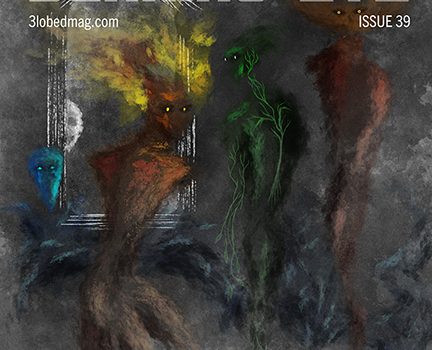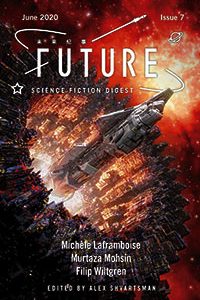Charles Payseur Reviews Short Fiction: Three-Lobed Burning Eye, Beneath Ceaseless Skies, and Strange Horizons
 Three-Lobed Burning Eye 7/23
Three-Lobed Burning Eye 7/23
Beneath Ceaseless Skies 7/27/23, 8/10/23, 8/24/23
Strange Horizons 7/24/23, 7/31/23, 8/7/23, 8/14/23
July saw a new issue from Three-Lobed Burning Eye, with a strange new story by J.L. Jones, ‘‘The Sticky-Sweet Path’’. The dreamlike narrative follows T’quan, a young man who chafes at the expectations and responsibilities of his life. People depend on him, and in the face of that he tries to escape, to embrace a seductive wildness that turns out to be a kind of trap leading into very dangerous territory. Jones reveals the pitfalls of a masculinity that is selfish, pleasure-driven, seeking only the sweet and not seeing the value in anything else. It’s a story about growing up, and perhaps a bit about getting the chance to grow up when life is a push between harsh reality and sweet dreams that act as the lure in kind of pitcher plant that it might be impossible to escape if someone gets in too deep. It’s a deeply weird but also moving and powerful story.
Beneath Ceaseless Skies closed out July with an issue focusing on cycles of use and abuse, featuring characters locked into habits that they want to break, but don’t know quite how to. Moving into August, and the first issue deals with thieves, memory, and trying to make right great wrongs. It includes M.A. Carrick’s tale of skullduggery, ‘‘The Naming of Knots’’, which finds journeyman thief Tseges being recruited by a much more famous thief – Rook, a living legend of indeterminate age and power. Their target is a seemingly impenetrable stronghold and, more problematic yet, a lock that one person can’t pick alone. In a profession where trust can often mean death, such a simple obstacle complicates things enormously, and provides plenty of spills and chills as Tseges tries to stay out of trouble while making sure that a tragedy caused by greed and corruption gets the attention and justice it deserves. Carrick keeps the action quick, the worldbuilding interesting, and Tseges always on the edge of ruin, where all good rogues belong. Closing out August is an issue full of high stakes, high fantasy tropes, and incredibly potent magic. Rajiv Moté takes the opportunity to cast a classic adventuring party finding, miraculously, a safe haven at precisely the moment they needed it most in ‘‘Interlude: Shelter From the Storm’’. Hounded and injured, they come to the house of Wattu like people on the verge of death finding an oasis in the desert. Only Tankrit, a necromancer, doesn’t trust what they have found. He’s used to assuming the worst, though, and finding it. Their world is on the edge of ruin, pushed there by the very craft he practices, which pushes the light of the world through a magical door in exchange for power. With the light nearly gone, he’s looking for a way to reverse the damage, and sees in his new host a being perhaps capable of doing just that. Moté looks at the nature of magic and shortcuts, though, returning to the idea that a problem created by cutting corners and taking the easy way cannot be solved in the same fashion. Some things have to be done the hard way, with no guarantee of success, and only the strength of people helping people. It’s a beautiful and insightful read.
I was particularly impressed by the poetry in the later July issues of Strange Horizons, including Charlie Espinosa’s ‘‘Sunflower Astronaut’’, which finds a seed describing its trip through space, its arrival in an alien world that it still somehow manages to grow roots into, to rise from the soil, to bloom and bear fruit. It becomes a part of this alien system, a part of the cycle of life that plays out again and again. Espinosa evokes balance and transformation in the poem, which seems to push readers to confront the assumptions of colonization and movement. The seed does not really grapple with whether or not it is invasive, but it also does not seek to dominate or choke out the life it finds already growing when it arrives. It’s a complex piece, still touched by the wonder of life and new worlds. Strange Horizons closed out July with a special childbearing issue, full of stories and poems, like Jonathan Chibuike Ukah’s ‘‘A Woman with a Stomach Full of Scars’’, that explore what it means to bear life and bring it into the world. The narrator of the poem yearns to know their mother more – her soul, her body, her personality, lending a sense that she is gone, or that the narrator will not have a chance to fully understand her mystery and her power. The piece really speaks to me of wanting to bridge the chasm of time and memory, to find the context and the stories behind the scars that the narrator was never fully told about. Those stories are out of reach, passed into legend where they could be almost anything, where the narrator is left with only the memories they have, the imprint from a mother who still looms large, but whose secrets might never be fully told.
Moving into August, and Strange Horizons’ fiction, Diana Dima captures a sense of growth, memory, and identity in ‘‘City Grown From Seed’’. The story finds Raffa moved to a new place, but carrying a seed from her home – of her home – that she plants. She feeds it with stories, and slowly it grows a bell tower and streets, houses and parks. As she grows up, Raffa visits less, internalizes the values that say her home was something she should leave behind. Both city and girl are hurting from all the things they cannot give each other. Dima does a wonderful job of showing how that hurt festers, how the girl grows and gets into toxic relationships, how the city rages and loses itself, but also how their story doesn’t have to be one of assimilation and erasure. That, together, they have other options, and it’s a moving look at the idea of home. Gabrielle Emem Harry shifts focus considerably in ‘‘A Name is a Plea and a Prophecy’’, which finds in Kuyom a girl without a home, an outcast who was orphaned and favored only by the cruel Adeh, god of the desperate, who always requires a sacrifice for his help, and who has a plan for young Kuyom who has been cursed so that anything that she loves, dies. It’s a grim premise and Harry explores it viscerally, following Kuyom as she lives and loses, as her desperation for an escape from her curse leads her to seek out death itself. And really the story is about desperate choices, and how terrible they are, because they must be made with full commitment, with hope, when hope is often the very thing that leads people into those desperate circumstances, and to the shattering consequences of them. It’s a gut punch of a read, and masterfully done.
Recommended Stories
“Interlude: Shelter From the Storm”, Rajiv Moté (Beneath Ceaseless Skies 8/23)
“A Name is a Plea and a Prophecy”, Gabrielle Emem Harry (Strange Horizons 8/23)
Charles Payseur is an avid reader, writer, and reviewer of speculative fiction. His works have appeared in The Best American Science Fiction and Fantasy, Lightspeed Magazine, and Beneath Ceaseless Skies, among others, and many are included in his debut collection, The Burning Day and Other Strange Stories (Lethe Press 2021). He is the series editor of We’re Here: The Best Queer Speculative Fiction (Neon Hemlock Press) and a multiple-time Hugo and Ignyte Award finalist for his work at Quick Sip Reviews. When not drunkenly discussing Goosebumps, X-Men comic books, and his cats on his Patreon (/quicksipreviews) and Twitter (@ClowderofTwo), he can probably found raising a beer with his husband, Matt, in their home in Eau Claire, Wisconsin.
This review and more like it in the October 2023 issue of Locus.
 While you are here, please take a moment to support Locus with a one-time or recurring donation. We rely on reader donations to keep the magazine and site going, and would like to keep the site paywall free, but WE NEED YOUR FINANCIAL SUPPORT to continue quality coverage of the science fiction and fantasy field.
While you are here, please take a moment to support Locus with a one-time or recurring donation. We rely on reader donations to keep the magazine and site going, and would like to keep the site paywall free, but WE NEED YOUR FINANCIAL SUPPORT to continue quality coverage of the science fiction and fantasy field.
©Locus Magazine. Copyrighted material may not be republished without permission of LSFF.








